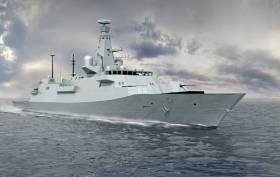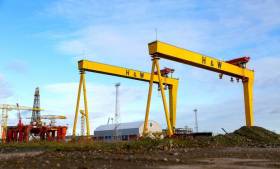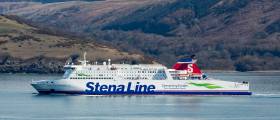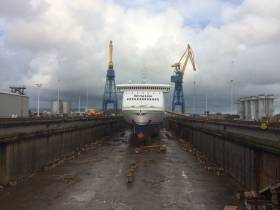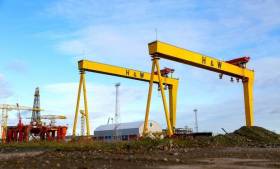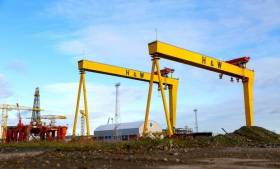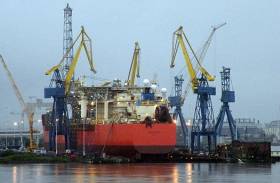Displaying items by tag: Harland & Wolff
UK's Royal Navy Name New Warship HMS Belfast
#NewHMSbelfast - One of the newest warships for the Royal Navy is to be called HMS Belfast writes The Irish News.
Defence Secretary Sir Michael Fallon made the announcement as his visited Harland and Wolff shipyard in the city, where the Navy's last HMS Belfast was built prior to World War Two.
The ship will be one of eight new Type 26 frigates joining the Navy's fleet. It will be used to protect the UK's nuclear submarines and aircraft carriers.
One of the "City Class" frigates has already been christened HMS Glasgow. They are due to enter service in the mid 2020s.
"I'm hugely proud that the second name announced of our eight cutting-edge new Type 26 frigates will be HMS Belfast," said Sir Michael.
For further comments made by the Defence Secretary on the frigate newbuild click here.
Tough Year as H&W Suffers With Job Cuts and Losses of £6m
#BelfastLough - The Belfast Telegraph writes that Harland & Wolff has reduced dozens of staff in an "unacceptable" year amid "difficult market conditions" which saw sales collapse and the firm posting massive losses of £6m.
The former Belfast shipbuilder, which constructed the Titanic, saw turnover dropping from £66.7m, to just £8.3m in the year ending December 31, 2016.
As a result Harland & Wolff Heavy Industries turned the previous year's £1m profit into an almost £6m loss.
The company said "in recognition of the very difficult trading conditions" the firm "further reduced its core employment in the second quarter of 2016".
It now has 115 staff, down from 170 at the end of the previous year.
"The directors consider the results for the year to be unacceptable but reflective of the very difficult market conditions in 2016," the firm's strategic report said.
For more on this story click here.
#StenaRefit - Refit of all seven ships of Stena Line's Irish Sea north ferry fleet totalling £5m has recently been completed.
The work carried out at the Harland & Wolff shipyard in Belfast took over a 4-month period. This involved careful synchronised dry-docking visits being managed by Stena Line’s Clyde-based sister company Northern Marine Ferries. The ferries including freight-only all operate on routes from Belfast to Cairnryan, Heysham (freight) and Birkenhead (Liverpool).
The 2017 refit programme was the first time that all seven Stena Line vessels went into dry dock sequentially, which represented a significant logistical challenge for the company. As well as coordinating over 150 specialist onsite contractors, Stena Line also introduced temporary relief vessels to ensure that sailing schedules and customer service levels were maintained throughout the entire process.
Paul Grant, Stena Line’s Trade Director (Irish Sea North) said: “Our refit programme is a key aspect of our ship management operation to ensure that our vessels operate as safely and efficiently as possible. Apart from the range of upgrades we have made to our onboard passenger facilities, what’s particularly striking about this year’s refit is that the Stena Line fleet now carries our new company strapline emblazoned on the side of our ships...Connecting Europe for a Sustainable Future...which demonstrates our future sustainability ambitions.”
Harland & Wolff Carries Out Annual Ferry Inspection Refits Likewise of Howth Boatyard
#Harland&Howth - Harland and Wolff, Belfast has been busy working with Stena Line ferries while in Howth Harbour, Co.Dublin the boatyard there has begun work on a passenger-only ferry that in recent years began running cruises, writes Jehan Ashmore.
The annual inspection refit contract at H&W is for Stena's Irish Sea fleet which has been underway this first quarter of 2017. While at Howth Boatyard work has just begun on a former Aran Islands ferry St. Bridget, before the passenger-only boat resumes service in late Spring for Dublin Bay Cruises.
Upgrade work at H&W of the Stena fleet includes main engine repairs, removal and repair of rudders, blasting and painting, deck repairs, repairs to life saving equipment. In addition work has involved technical enhancements of the ferries.
Stena Europe, Stena Lagan and Stena Mersey and freight-only ferry, Stena Hibernia have been completed and returned to service.
The Stena Superfast X is currently in dry-dock. A replacement ropax Stena Nordica was observed by Afloat.ie in Dublin Port yesterday as this ferry is standing in to the Superfast X sailings on the Holyhead route. The central corridor service is also maintained as usual by route partner Stena Adventurer.
The next caller to the Belfast dry-dock for annual inspection will be Stena Superfast VIII. A further three ferries are scheduled in the annual programme to ensure the operator's Irish Sea Fleet is running to optimum efficiency.
Prospect of Naval Work at Harland & Wolff Welcomed
#NavalNewbuilds? - Proposals of future naval shipbuilding to be shared around UK yards including Harland & Wolff writes The News Letter have been warmly welcomed in Belfast.
The report prepared by Ulster-born industrialist Sir John Parker - a former chief executive at H&W - was published in London on Monday and contains many criticisms of the current status quo with Royal Naval procurement.
Although it is unlikely a brand new warship would ever be built entirely in Belfast, Sir John’s call for “sea-change” in current procurement procedures would see ships built in modular form across the UK for final assembly at a specific hub.
Current processes led to time delays in the supply of new vessels which in turn left old ships “retained in service well beyond their sell-by date with all the attendant high costs of so doing”.
Sir John said there was a “vibrant” UK shipbuilding, marine and defence supply chain sector which the Ministry of Defence (MoD) should harness.
For more on this topic click here.
200 Jobs Secured At Harland & Wolf With 'Multi-Million Pound Contract'
#H&Wcontract - A major manufacturing contract to Harland and Wolff has been secured which the company says will support 200 jobs.
The BBC News writes that the "multi-million pound contract" is with wind farm developer Scottishpower Renewables.
The engineering firm is to make 24 steel foundation jackets for wind turbines to be used in the North Sea. The work will take two years to complete.
Harland and Wolff said the new contract is "very significant for Belfast".
It added that the structures, at more than 65m tall, will almost be as "prominent in the Belfast skyline as the famous Samson and Goliath cranes".
Harland and Wolff stopped shipbuilding in 2003 and its more recent work has included refurbishing oil rigs.
In March, it announced 60 jobs were to go because of a downturn in the offshore oil and gas sector.
Accounts for last year show it had made a profit of £1m and described market conditions as difficult.
#WorldsLargest - The world's most powerful tidal energy turbine writes the BBC News was assembled at Harland and Wolff shipyard in Belfast.
One of the yard's cranes, Goliath, will lower the 520-tonne structure into Belfast Lough today, Wednesday.
Each of the its twin rotor arms produces 1 megawatt of energy - enough to power thousands of homes when connected to the electricity grid.
After trials in the lough, the turbine will be used off the Orkney Islands.
The 75-metre long structure has taken a year to put together.
It will float on the water with the rotors dropped below the surface.
Harland & Wolff Announces 60 Job Losses
#JobLosses - Sixty jobs are set to go at Harland & Wolff, the losses represent approximately one third of the east Belfast engineering firm's permanent workforce, reports BBC News.
Discussions are soon to get underway with unions.
The company is blaming the move on a downturn in the offshore oil and gas sector. The firm stopped shipbuilding in 2003.(Afloat, adds the last vessel built was the Anvil Point).
Its activities now include the repair and refurbishment of vessels ands oil rigs.
Unions have described the news as "the latest bad news story for manufacturing in Belfast and Northern Ireland".
They added the decision "reflects the recent decline in the company's order books". For more on this story, click here.
Harland & Wolff Dry Docks Rival Ferries
#FerryRefits - The Belfast firm, Harland and Wolff, one of Europe's largest heavy engineering facilities is drydocking a pair of rival ferries for routine annual winter refits, writes Jehan Ashmore.
In recent days, Irish Ferries seasonal French routes cruiseferry, Oscar Wilde entered the facilities Belfast Dry Dock, having covered Rosslare-Pembroke sailings.
At 335 metres in length, the 50.39m wide drydock provides plenty of space for the Rosslare-based 166 metre ferry on a beam of 28 metres. Upon completion of the work, Oscar Wilde launches the year's season with Rosslare-Cherbourg sailings on 24 February and opens the Roscoff service on 6 May.
The rest of the Irish Ferries fleet (except Epsilon) received dry dockings at Cammell Laird, Birkenhead and also A&P Falmouth.
Rivals Stena Line which began last month a £4.4m contract with Harland & Wolff to refit seven Irish Sea based vessels, among them a Belfast-Cairnryan ferry, the 203 metre Stena Superfast VIII. The ferry is located in the larger Main Dock which measures 556 metres long. Spanning the 93m wide dock are the famous Samson & Goliath gantry cranes that dominate the skyline.
Over the course of the two-month contract, each Stena ferry will visit the shipyard on a carefully sequenced timetable to facilitate a range of specialist works.
Harland & Wolff in a separate yet related contract to Stena Bulk (part of the Stena Group) carried out major refit work that began last year on the ‘Aframax’ ice-class 240m long Stena Arctica.
On that occasion, the 117,000 dwt crude oil tanker that features an ice-breaking bow to cope with polar conditions had also occupied Belfast Dry Dock.
Harland & Wolff Completes Rig 'Byford Dolphin' Contract
#RigContract -Harland and Wolff, Belfast has completed the dry docking and SPS Class Renewal Survey of the Byford Dolphin Mobile Offshore Drilling Unit (MODU) during the summer.
The offshore oil rig platform departed Belfast following a six-month dry docking in the ship yard's main Building Dock (556m x 93m) from where the iconic pair of the Samson & Goliath gantry cranes towered above the Byford Dolphin since arrival in January.
Harland and Wolff Director of Marine and Offshore Unit Repair, James Lappin, said "Over the years Harland and Wolff and Dolphin Drilling have collaborated on several occasions, having fabricated pontoons, column extensions, power generation and accommodation modules for other vessels in the Dolphin fleet."



























